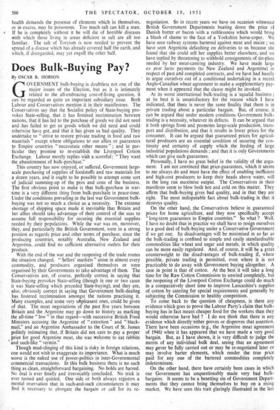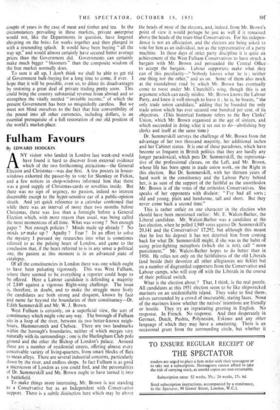Does Bulk-Buying Pay?
By OSCAR R. HOBSON
OVERNMENT bulk-buying is doubtless not one of the major issues of the Election, but as it is intimately related to the all-embracing cost-of-living question, it can be regarded as quite an important subsidiary issue. Both Labour and Conservatives mention it in their manifestoes. The Conservatives say that the Socialist policy of State-buying pro- vokes State-selling, that it has fostered recrimination between nations, that it has led to the purchase of goods we did not need and has failed to get us goods which we did need and could otherwise have got, and that it has given us bad quality. They undertake to " strive to restore private trading in food and raw materials " except where obligations to our allies or guarantees to Empire countries " necessitate other means " ; and in par- ticular they promise to re-establish the Liverpool Cotton Exchange. Labour merely replies with a scornful: They want the abandonment of bulk-purchase."
This country has now enjoyed, or suffered, Government large- scale purchasing of supplies of foodstuffs and raw materials for a dozen years, and it ought to be possible to attempt some sort of judicial summing-up of the pros and cons of the business. The first obvious point to make is that bulk-purchase in war- time is a very different thing from bulk-purchage in peace-time. Under The conditions prevailing in the last war Government bulk- buying was not so much a choice as a necessity. The extreme shortage of shipping space made it inevitable that Britain and her allies should take advantage of their control of the seas to assume full responsibility for securing the essential supplies needed by their populations. While the war was on, moreover, they, and particularly the British Government, were in a strong position as regards price and other terms of purchase, since the producing countries, notably Australia, New Zealand and Argentina, could find no sufficient alternative outlets for their produce.
With the end of the war and the reopening of the trade routes the situation changed. " Sellers' markets " arose in almost every commodity, and producers organised themselves or were organised by their Governments to take advantage of them. The Conservatives are, of course, perfectly correct in saying that State-buying provokes State-selling (though in one or two cases it was State-selling which preceded State-buying), and they are, also, obviously correct in saying that Government bulk-dealing has fostered recrimination amongst 'the nations practising it. Many examples, and some very uApleasant ones, could be given of that. The meat negotiations of the past five years between Britain and the Argentine may -go down to history as marking the all-time " low " in that regard—with successive British Food Ministers accusing the Argentine of " extortion " and " black- mail," and an Argentine Ambassador to the Court of St. James politely intimating that, if Britain did not care to pay a proper price for good Argentine meat, she was welcome to eat rabbits and such-like " vermin."
Though mud-slinging of this kind is risky in foreign relations, one would not wish to exaggerate its importance. What is much worse is the naked use of power-politics in inter-Governmental commercial transactions. In this bulk business there is no such thing as clean, straightforward bargaining. No holds are barred. No deal is ever finally and irrevocably concluded. No trick is ever turned and quitted. One side or both always registers a mental reservation that in such-and-such circumstances it may find it necessary to abrogate the bargain or call for its re- negotiation. So in recent years we have on occasion witnessed British Government Departments beating down the price of Danish butter or bacon with a ruthlessness which would bring a blush of shame to the face of a Yorkshire horse-roper. We have seen railway systems- bartered against meat and maize ; we have seen Argentina defaulting on deliveries to us because she found that she could sell her supplies better elsewhere,-and we have replied by threatening to withhold consignments of tin-plate needed by her meat-canning industry. We have made large ex post facto payments (to New Zealand and Argentina) in respect of past and completed contracts, and we have had hastily to argue ourselves out of a conditional undertaking in a recent Anglo-Canadian wheat agreement to make a supplementary pay- ment when it appeared that the clause might be invoked.
At its worst international bulk-trading is a -Squalid business ; at its best it is unsatisfactory for the reason which I have indicated, that there is never the same finality that there is in private trading about a particular bargain. But, of course, it can be argued that under modern conditions Government bulk- trading is a necessity, whatever its defects. It can be argued that it both springs from and promotes large-scale production, trans- port and distribution, and that it results in lower prices for the consumer. It can be argued that guaranteed prices for agricul- tural producers are an essential condition of securing the con- tinuity and certainty of supply which the feeding of large industrial populations demands ; and that it is only Governments which can give such guarantees. '
Personally, I have no great belief in the validity of the argu- ment. I am not convinced that price-guarantees, which it seems to me always da and must have the effect of enabling inefficient and high-cost producers to keep their heads above water, will in the long run maximise output. The Conservatives in -their manifesto seem to blow both hot and cold on thismatter. They affirm that bulk-buying gives bad quality, and in that they are right. The most indisputable fact about bulk-trading is that it destroys quality.
On the other hand, the Conservatives believe in guaranteed prices for home agriculture, and they now specifically accept long-term guarantees to Empire countries." So what ? Well, I have no doubt that in practice we shall have to resign ourselves to a good deal of bulk-buying under a Conservative Government if we get one. Its disadvantages will be minimised in so far as the bulk-trading is confined to simple and easily standardisable ' commodities like wheat and sugar and metals, in which quality can be more easily regulated. And, of course, it will be a great counterweight to the disadvantages of bulk-trading if, where possible, private trading is permitted, even where it is not practicable to do away with Government buying altogether. A case in point is that of cotton. At the best it will take a long time for the Raw Cotton Commission to unwind completely, but the reopening of the Liverpool Cotton Exchange could do much in a comparatively short time to improve Lancashire's supplies of cotton by catering for special requirements and generally by subjecting the Commission to healthy competition.
To come back to the question of cheapness, is there any evidence.which goes to prove the Labour Party's claim that bulk- buying has in fact meant cheaper food for the workers than they would otherwise have had ? I do not think that there is any evidence which directly either proves or disproves that assertion. There have been occasions (e.g., the Argentine meat agreement of 1946) when it has appeared that we have made a very good bargain. But, as I have shown, it is very difficult to judge the merits of any individual bulk deal, seeing that an agreement may clever be fully carried out or may be re-negotiated later or may involve barter elements, which render the true price paid for any one of the bartered commodities completely indeterminate.
On the other hand, there have certainly been cases in which our Government hag unquestionably made very bad bulk- bargains. It seems to be a besetting sin of Government Depart- ments that they cannot bring themselves to buy on a rising market. We have seen this trait glaringly illustrated in the last
couple of years in the case of meat and timber and tea. In the circumstances prevailing in these markets, private enterprise would not, like the Departments in question, have lingered shivpring on the brim; for weeks together and then plunged in with a resounding splash. It would have been buying " all the way up," and would almost certainly have secured better average prices than the Government did. Governments can certainly make much bigger " bloomers " than the composite wisdom of the free market normally does.
To sum it all up, I donk think we shall be able to get rid of Government bulk-buying for a long time to come, if ever. I hope that it will be possible, even so, to dilute its disadvantages by restoring a great deal of private trading- pretty soon. This could bring the country substantial revenuelrom abroad and so strengthen the vitally needed " invisible income," of which the present Government has been so misguidedly careless. But we must not blind ourselves to the fact that free convertibility of the pound into all other currencies, including dollars, is an essential prerequisite of a full restoration of our old position of the world's market-place.



































 Previous page
Previous page